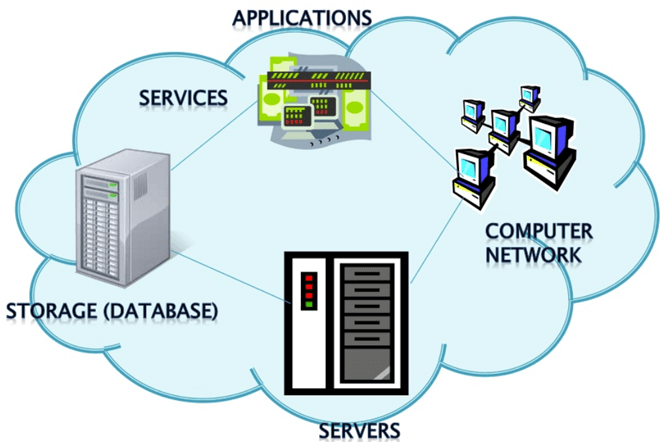Advantages and Disadvantages Of Cloud Computing
What is Cloud Computing?
Cloud computing is a term referred to storing and accessing data over the internet. It doesn't store any data on the hard disk of your personal computer. In cloud computing, you can access data from a remote server.
Advantages of Cloud Computing
Here, are important benefits for using Cloud computing in your organization:

Cost Savings
Cost saving is the biggest benefit of cloud computing. It helps you to save substantial capital cost as it does not need any physical hardware investments. Also, you do not need trained personnel to maintain the hardware. The buying and managing of equipment is done by the cloud service provider.
Strategic edge
Cloud computing offers a competitive edge over your competitors. It helps you to access the latest and applications any time without spending your time and money on installations.
High Speed
Cloud computing allows you to deploy your service quickly in fewer clicks. This faster deployment allows you to get the resources required for your system within fewer minutes.
Back-up and restore data
Once the data is stored in a Cloud, it is easier to get the back-up and recovery of that, which is otherwise very time taking process on-premise.
Automatic Software Integration
In the cloud, software integration is something that occurs automatically. Therefore, you don't need to take additional efforts to customize and integrate your applications as per your preferences.
Reliability
Reliability is one of the biggest pluses of cloud computing. You can always get instantly updated about the changes.
Mobility
Employees who are working on the premises or at the remote locations can easily access all the could services. All they need is an Internet connectivity.
Unlimited storage capacity
The cloud offers almost limitless storage capacity. At any time you can quickly expand your storage capacity with very nominal monthly fees.
Collaboration
The cloud computing platform helps employees who are located in different geographies to collaborate in a highly convenient and secure manner.
Quick Deployment
Last but not least, cloud computing gives you the advantage of rapid deployment. So, when you decide to use the cloud, your entire system can be fully functional in very few minutes. Although, the amount of time taken depends on what kind of technologies are used in your business.
Other Important Benefits
Apart from the above, some other advantages of cloud computing are:
- On-Demand Self-service
- Multi-tenancy
- Offers Resilient Computing
- Fast and effective virtualization
- Provide you low-cost software
- Offers advanced online security
- Location and Device Independence
- Always available, and scales automatically to adjust to the increase in demand
- Allows pay-per-use
- Web-based control & interfaces
- API Access available.
Disadvantages of Cloud Computing
Here, are significant challenges of using Cloud Computing:
Performance Can Vary
When you are working in a cloud environment, your application is running on the server which simultaneously provides resources to other businesses. Any greedy behavior or DDOS attack on your tenant could affect the performance of your shared resource.
Technical Issues
Cloud technology is always prone to an outage and other technical issues. Even, the best cloud service provider companies may face this type of trouble despite maintaining high standards of maintenance.
Security Threat in the Cloud
Another drawback while working with cloud computing services is security risk. Before adopting cloud technology, you should be well aware of the fact that you will be sharing all your company's sensitive information to a third-party cloud computing service provider. Hackers might access this information.
Downtime
Downtime should also be considered while working with cloud computing. That's because your cloud provider may face power loss, low internet connectivity, service maintenance, etc.
Internet Connectivity
Good Internet connectivity is a must in cloud computing. You can't access cloud without an internet connection. Moreover, you don't have any other way to gather data from the cloud.
Lower Bandwidth
Many cloud storage service providers limit bandwidth usage of their users. So, in case if your organization surpasses the given allowance, the additional charges could be significantly costly
Lacks of Support
Cloud Computing companies fail to provide proper support to the customers. Moreover, they want their user to depend on FAQs or online help, which can be a tedious job for non-technical persons.
Conclusion:
Despite all the pro and cons, we can't deny the fact that Cloud Computing is the fastest growing part of network-based computing. It offers a great advantage to customers of all sizes: simple users, developers, enterprises and all types of organizations. So, this technology here to stay for a long time.
Cloud Computing, has now made it effortlessly easy for all to access applications and software from the internet. Earlier the software and applications had to be physically installed but not anymore. With the evolution in technology and the feasibility to access beneficial apps off the internet, businesses are reaping huge benefits from cloud computing.
However, along with the advantages cloud computing provides, the disadvantages are pretty evident. There are several advantages with cloud computing, and there are prominent setbacks as well.
Advantages
Cost Saving
Cloud computing has invariable benefited businesses and organizations to help cut costs. The core strategy of every business is to churn out as much revenue as possible, while keeping the expenses at a minimum. With Cloud Computing, you can save substantial capital costs, with zero expense as you don’t need to install applications or in-house servers. With no in-house servers, the operational costs of running and maintaining them is eliminated. If the servers were present physically this would call for massive expenses for maintenance, air conditioning, power and other associated expenses.
The benefits of associating your business process with cloud is that you pay for the services, and disengage whenever you don’t need the storage service. Organizations do not need to worry about expending a massive portion of the IT capital for an in-house sever.
Often people wonder if it is extremely expensive to afford the cloud, but the fact is that it’s quite convenient even for small businesses to get on the cloud. Cloud services are quite affordable for small businesses as well.
Reliability
With the need to cater to a larger diverse audience, comes a massive bout of responsibility as well. The cloud infrastructure has to be very efficient in catering to the needs of several clients and maintain its consistency in its functionality and services. Most cloud service providers assure a guarantees assistance round the clock for all days of the contract and there is always close to 100% availability. You don’t need to worry about server maintenance and if the host server fails, the hosted files can easily be transitioned to other available servers.
Manageability
The ordeal of maintaining and dealing with server issues become almost non-existent with cloud services. With opting to venture onto cloud services, businesses will benefit massively for enhanced and structured IT services and the various intricate details of managing the servers. All the services related technicalities are taken care by the service provider and you will enjoy the luxury of a simple web-based user interface to access your applications, services and services. Businesses now need not worry about the installation and massive expenditure on setting up a server with all the amenities. The service providers abide by the signed Service-Level-Agreement to ensure timely assistance to your business needs and they guarantee to provide the required service to help you use the cloud based servers.
Strategic Edge
With competitions soaring high, you might be in need of the latest applications to catch up with the rest of the crowd. Through cloud computing you will have access to the latest apps and infrastructure to create, develop and enhance your deliverables. Your company could access software that is the need of the hour, without actually having to invest in installations or in the maintenance of the software.
Cloud computing lets you focus on your key business objectives and not worry too much about the installation of applications and software.
Disadvantages of Cloud Computing
Downtime
With massive overload on the servers from various clients, the service provider might come up against technical outages. Due to this unavoidable situation your business could be temporarily sabotaged.
And in case your internet connection is down, you will not be able to access the data, software or applications on the cloud. So basically you are depending on the quality of the internet to access the tools and software, as it is not installed in-house.
Security
There is room for imminent risk for your data even though cloud service providers abide by strict confidentiality terms, are industry certified and implement the best security standards. When you seek to use cloud-based technology you are extending your access controls to a third party agent to import critical confidential data from your company onto the cloud. With high levels of security and confidentiality involved, the cloud service providers are often faced with security challenges.
The presence of data on the cloud opens up a greater risk of data theft as hackers could find loopholes in the framework. Basically your data on the cloud is at a higher risk, than if it was managed in-house.
Hackers could find ways to gain access to data, scan, exploit a loophole and look for vulnerabilities on the cloud server to gain access to the data.
For instance, when you are dealing with a multi-tenant cloud server, the chances of a hacker breaking into your data is quite high, as the server has data stored by multiple users. But the cloud-based servers take enough precautions to prevent data thefts and the likelihood of being hacked is quite less.
Vendor Lock-In
Companies might find it a bit of a hassle to change the vendors. Although the cloud service providers assure that it is a breeze to use the cloud and integrate your business needs with them, disengaging and moving to the next vendor is not a forte that’s completely evolved. As the applications that work fine with one platform may not be compatible with another. The transition might pose a risk and the change could be inflexible due to synchronisation and support issues.
Limited Control
Organisations could have limited access control on the data, tools and apps as the cloud is controlled by the service provider. It hands over minimal control to the customer, as the access is only limited to the applications, tools and data that is loaded on the server and no access to the infrastructure itself. The customer may not have access to the key administrative services.
Conclusion
The advantages of cloud computing is way too good, is quite cost effective and it is efficient. The drawbacks are incidental and almost negligible. The decision to opt for cloud based services is great with saving substantial costs with regards to installation and maintenance, reduced downtime, almost negligible manpower involved in monitoring the servers and no collateral investment with regards to the infrastructure required to house the servers in-house.



Nice Blog Usefull infrmation.CLOUD-FIRST is a captivating concept around which the emerging businesses are predominantly dependent upon.more details Zero cost cloud Migration services
ReplyDelete